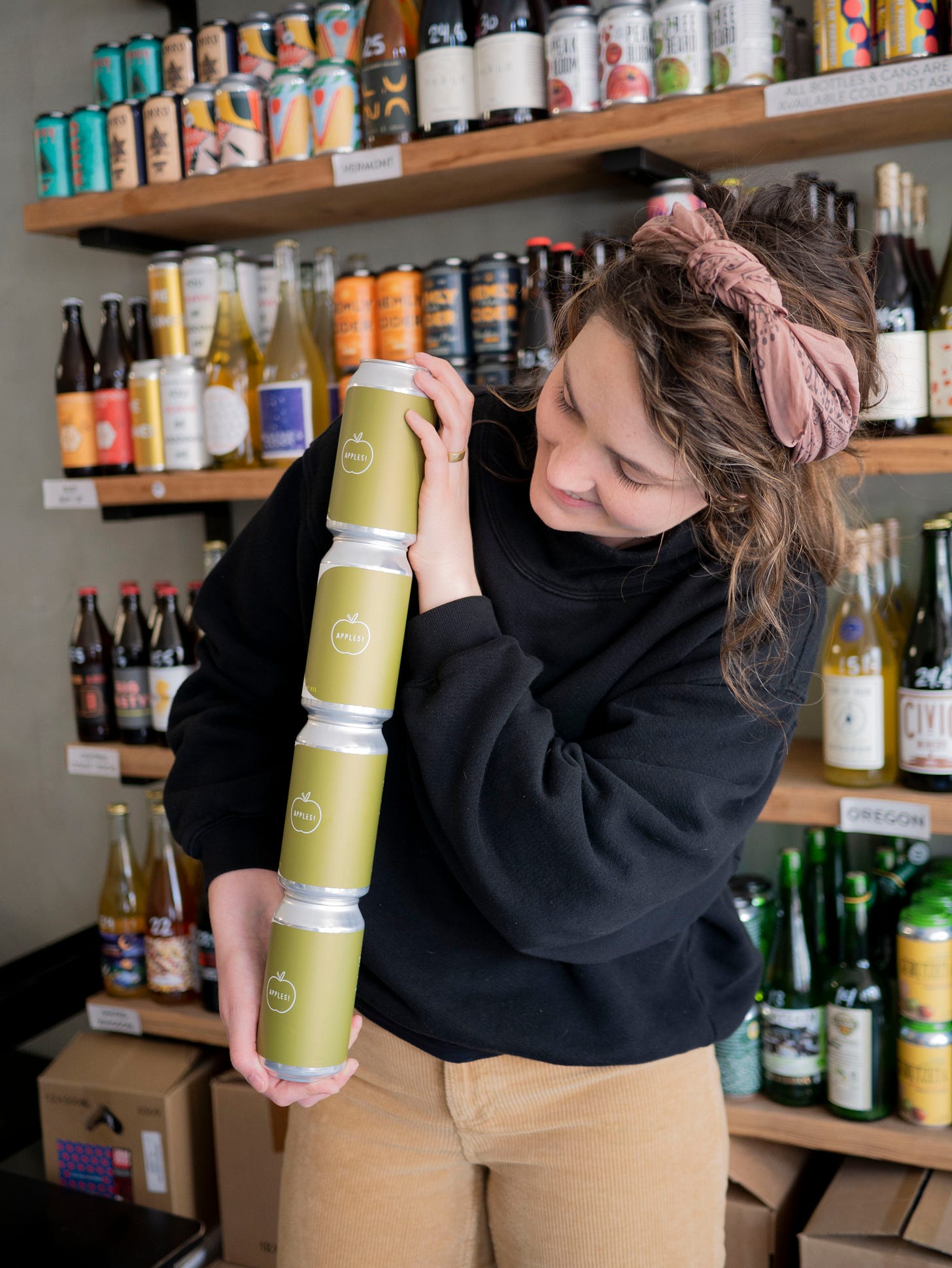Olivia Maki Is A Work In Progress
Meet the Oakland-based cider bar owner, writer, and food educator.
A very quick word from Prohibitchin’s sponsors (who keep this newsletter free!):
Reverend Nat's Hard Cider in Portland, Oregon is known for making the most unusual ciders that no one else will make, such as the limited release No Justice No Peach, now available for direct shipping to 42 states. Learn more at revnats.com.
From full-scale brand building to ongoing label solutions and marketing support, Stout Collective in Chicago, Illinois is a comprehensive resource for brewery and beverage partners. Learn more about them, their work, and how they’re building a more visually interesting beer world at stoutcollective.com.
California has long appealed to wanderers, artists, and dreamers, inspiring entire playlists and drawing generations of people to the Golden State’s shores. Olivia Maki fell under California’s spell long ago, describing a “magical mystique” that propelled her to the Bay Area 13 years ago and started her down the path she’s now walking as co-owner of Redfield Cider Bar & Bottle Shop in Oakland. She’s also the founder of OLMA Creative Agency, which specializes in “marketing and communications support for food, farm and beverage businesses.” Olivia wants to open our eyes to the reality of where our food and drink comes from, and she’s using every avenue at her disposal to get the message across. “Once you open the door and you see all of the hands that go into growing food, and the effort that goes into it, it’s hard to not think about that all the time,” she says. So, let’s start thinking about it!
It’s always nerve-wracking to interview someone, but especially so when that someone is also good at interviewing people. Case in point: Olivia Maki, whose bylines include Civil Eats, San Francisco Chronicle, and Malus, writing about how customer service runs both ways, American cider’s history of racism (and subsequent whitewashing of its past), and even appearing (so to speak) on the Cider Chat podcast on Episode #207.
Her writing prowess proves to be unquestionably sharp, but it’s not her primary focus in the day-to-day. That honor is occupied by Redfield, the “petite bar” and bottle shop she co-owns and operates with her husband Mike Reis. (Did I mention he’s an Advanced Cicerone and also writes?)
There aren’t very many cider-centric bars or bottle shops in the United States: I’d guess there are fewer than a dozen. They’re not even an endangered species—more like an ultra-niche novelty that I would really like to see become more popular. Through Redfield, Olivia is doing her damndest to transform cider’s novelty into the mainstream.
She laughs when she remembers the initial idea to open a cider bar and bottle shop. “The world didn’t need another beer spot,” she says. But selling the concept to landlords proved difficult. “None of them knew what cider was!”
Eventually, the pair found the perfect location in the Rockridge neighborhood and was able to open Redfield’s doors in January 2019. More specifically, they opened one year and three months before the world shut down for the COVID-19 pandemic. It was particularly bad timing for all hospitality, but especially fledgling projects only just starting to hit their stride. Olivia reflects at that strange time with a mix of emotions.
“When we opened, I was just so nervous that we were going to fail,” she recalls, saying she seemed “fixated” on the worst possible outcome. As it turns out, her worries were for naught. Getting through the pandemic required “devastating” layoffs, which she calls “the worst days of my life.” But with the benefit of hindsight (and realizing they, in fact, did not fail), she says the challenges of the past few years have actually pushed Redfield in a better direction than she initially dreamed. They were eventually able to not only rehire staff, build an outdoor parklet, and recently hit pre-pandemic numbers, but also shifted their attitude towards operations in a more balanced direction.
With a strong commitment to agricultural equity and labor rights, Olivia had to undo her experience being taught “the customer is always right” in order to build a safe and respectful environment for customers and employees. The pandemic has left many people short on money, manners, and patience, taking it out on hospitality workers around the world. A few incidents with disrespectful customers (she’s quick to say the majority of Redfield patrons “are awesome”) proved to be a catalyst for them to intensify their onboarding procedure.
“We’re really focused on creating safe environments for our employees,” she says. “That shift from ‘how can I make you [customers] feel as comfortable as possible so that you want to stay?’ [to] ‘if you’re not making me feel comfortable, we don’t actually want you as a customer’... it was a real a-ha moment.”
Protecting employees from harassment or abuse shouldn’t be reactive, Olivia says, and it shouldn’t be the responsibility of staff to ask for. “If you're interested in working in hospitality and you're coming from a historically marginalized community or an underrepresented group, I recommend asking your future employer some tough questions and seeing how they respond. Ask them ‘how do you define equity in your space? Would you consider your bar an inclusive work environment?’ See how they respond to that, because, in my opinion, I think it's the employers responsibility to create safe spaces for their employees. That onus doesn't fall on the employees to have to demand it. It's something that should be a right for them.”
Building a more just world is a never-ending process, so Olivia believes in a “progress, not perfection” approach. Measuring that progress is harder to quantify than dollars and cents, but as long as the doors are open, people are happy, and the hummus tastes good, “that is success,” she says.
Success also means having an opportunity to educate people about not just food and drink, but where said foods and drinks come from. When Olivia first arrived in the Bay Area in 2010, she began volunteering at 18 Reasons, a “nonprofit cooking school on a mission to empower our community with the confidence and creativity needed to buy, cook, and eat good food everyday,” according to their website. Two life-changing things came from her time there: she met her future husband, and she built the foundation for her ethos of equity throughout the food and agricultural systems.
“Here's where your food is coming from, here's how you cook it, here's how you appreciate it, and this is why you should pay more,” she explains, pointing out that common staples we take for granted are so much more than basic. “There are so many hands that touch that apple or jar of peanut butter before it hits the grocery store. It’s something that felt really powerful and really resonated with me, and I wanted to continue to be able to tell that story… that’s my foundation. That thinking and that foundation definitely leads into how I talk about beverage today.”
Olivia says cider is uniquely positioned as a consumable. “There’s a real connection to the land,” she explains. “That more we can talk about that, I think it’s better for the consumer and the farmer in the long run.” Connecting people to the earth isn’t always easy in an urban area like Oakland, but Olivia says Redfield’s location is strategic in order to reach people both where they live and where they might not otherwise be exposed to farms. It’s her chance to show the world, or at least her patrons, what it really takes to create things like wine and cider.
“The food system in the U.S. would look radically different if everyone had to spend a week on a farm,” says Olivia. If that remains out of reach, she’s always available for a conversation over a glass of something delicious.
Follow Olivia and Redfield at @redfieldciderbar on Instagram or their website redfieldcider.com.
What I’m Doing
On Saturday, April 22 from 3:15pm - 4:30pm Eastern Time, I’ll be a panelist on a virtual discussion titled “What’s The Buzz About the Beer Beat?” It will be moderated by Robert (Bob) Cole, Ph.D., a professor of communication studies at Roger Williams University in Bristol, Rhode Island as part of a regional conference for the Society of Professional Journalists. I have no other information about who the other panelists are or how to tune in! But it should be easy to find (and I’m sure I’ll post about it on Instagram), so if you want to hear how to be a “successful professional beer writer",” keep an eye out for more details.
What I’m Drinking
Beale’s Beer in Bedford, Virginia sent me a couple cans of their Gold Helles Lager and Fruited Peach Tea Blonde Ale, both which fall under 5.0% ABV and both really, really refreshing and tasty. No, I didn’t pay for them but yes, I would if I ever found myself in the Blue Ridge Mountain region. (That’s more likely than it sounds—I still have plenty of friends and family back in the Old Dominion.) The rest of their beer list looks pretty damn tasty, too.
Where I’m Traveling
March is weirdly jam-packed with little trips all over the place: visiting my grandparents in Riverside County, camping at Nopalito Farm in North County (or brunch with friends in Tijuana—the possibilities never cease!), spending a weekend in Palm Desert with my family and mother-in-law, and it’s not even spring break yet. But that’s one of the things I truly love about California—you can drive for two hours in any direction and be in a new, awesome place unlike anywhere else in the world. Where are you traveling this month? Leave a comment and let me know!
I Want To Hear From You!
Now that Prohibitchin’ has two sponsors to keep it afloat, I’d love to expand some of our offerings based on your feedback. What would you love to see from Prohibitchin’? Stickers? Shirts? More interviews? Podcasts? Let me know what you’re hankering for by sending me an email.
Do you know of a woman or non-binary person working in beverage alcohol who hasn’t seen the spotlight—and should? Nominate them for a future feature!







